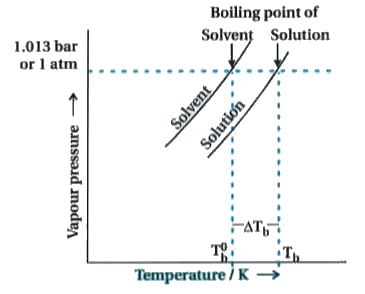Saved Bookmarks
| 1. |
What is molal elevation ? Explain. |
|
Answer» Solution :Increase in boiling point of a solution prepared by dissolving one gram molar mass of non volatile solute in one KILOGRAM of solvent is called as molal elevation. The boiling point of a solution is always higher than that of the pure solvent in which the solution is prepared, the elevation of boiling point ALSO depends on the number of solute MOLECULES rather than their nature. Let `T_(b)^(0)` be the boiling point of pure solvent and `T_(b)` be the boiling point point of solution. The increase in the boiling point `Delta T_(b)=T_(b)-T_(b)^(0)` is known as elevation of boiling point. For dilute solutions the elevation of boiling point `(Delta _(b))` is directly proportional to the molal concentration of the solute in a solution. Thus, `Delta T_(b)prop m` `Delta T_(b)=K_(b)m ""` ....(1) Where, m molality `K_(b)=` Boiling Point Elevation Constant or Molal Elevation Constant (Ebullioscopic CONSTAT) The unit of `K_(b)` is K kg `MOL^(-1)`. If `w_(2)` gram of solute of molar mass `M_(2)` is dissolved in `w_(1)` gram of solvent, then molality, m of the solution is given by the expression : `m=(w_(2)xx M_(2))/(w_(1)//1000)=(1000xx w_(2))/(M_(2)xx w_(1))` Substituting the value of molality in equation (1) we get `Delta T_(b)=(K_(b)xx1000xx w_(2))/(M_(2)xx w_(1))` `M_(2)=(1000xx w_(2)xx K_(b))/(Delta T_(b)xx w_(1))` 
|
|
Discussion
No Comment Found
Related InterviewSolutions
- Which of the following compounds is not cleaved by HI even at 525 K ?
- To a 25 mL H_(2)O_(2) solution excess of an acidified solution of potassium iodide was added. The iodine liberated required 20 " mL of " 0.3 N sodium thiosulphate solution Calculate the volume strength of H_(2)O_(2) solution.
- The suggested mechanism of a reaction is : (a) A+BhArrD("fast) "(b)A+Drarr2C("slow")Write the balanced equation of the reaction if its experimentally deduced rate equation is , rate k=[A]^(2)[B] Find the intermediate formed during the course of the reaction . Does the predicted rate law from the mechanism match the experimental rate law ?
- Which of these changes with time for a first-order reaction A Rate of reaction B . Rate constant C . Half-life
- What is the hybridisation of central atom in the product obtained along with hydrofluoric acid when complete hydrolysis of Xenon Hexa Fluoride takes place ?
- Which of the following amino acid forms sulphide bond in polypeptide
- Which of following pair is Diastereomers:
- What is the major product of the following reaction CH_3C-=C-CH_2-CH_3overset("1 mole of " Cl_2)to
- Which polymer is used in petrol tank linings ?
- Which of the following carbohydrates are branched polymer of glucose ?